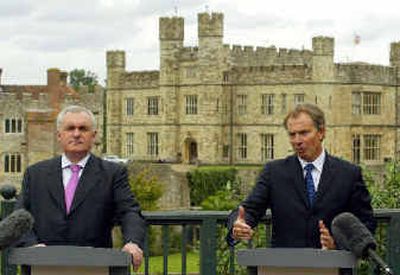Accord still elusive in N. Ireland talks

LEEDS CASTLE, England – High-pressure talks among rival Northern Ireland parties ended Saturday with no agreement to revive a Catholic-Protestant administration, but British Prime Minister Tony Blair insisted that a deal “historic in its meaning” may yet be achieved.
As tired delegations departed from Leeds Castle, the magnificent moat-encircled venue for talks that began Thursday, most factions suggested that the outlawed Irish Republican Army now holds the initiative.
A statement from the underground group, expected to detail its conditions for disarming fully and renouncing violence, may come within a week.
Without sufficiently clear-cut commitments, the Democratic Unionist Party insists it will never share power with Sinn Fein, the IRA-linked party that represents most of the north’s Irish Catholics.
“I am too old to be bluffed. We say we will believe it when we see it. And we’re going no farther than that,” said Ian Paisley, the 78-year-old evangelist whose Democratic Unionist Party represents most of Northern Ireland’s British Protestant majority.
Blair and Irish Prime Minister Bertie Ahern – who oversaw Northern Ireland’s Good Friday accord of 1998 and have spent two years striving to revive its central goal of power-sharing – stood side by side inside the castle as the delegations filtered out separately. They looked physically beat, but tried to sound upbeat.
Blair said negotiators had “not yet achieved a comprehensive agreement” but insisted that lower-level talks next week would keep pressing. “There is huge potential in what has happened here,” he said.
“We believe we can resolve issues to do with ending paramilitary activity and putting weapons beyond use. We believe what is now on offer is reasonable in substance and historic in its meaning,” Blair said.
Despite this confidence, Blair said he hadn’t actually seen a formal statement from the IRA during his negotiations with Sinn Fein. He said Sinn Fein-IRA chiefs “know exactly what is required if they want to move this process forward. We will have to wait to see what response we get.”
The U.S. envoy for Northern Ireland, State Department official Mitchell Reiss, said he was also optimistic that a deal could be worked out in coming weeks.
“There is a genuine prospect that politics in Northern Ireland will be pursued exclusively through peaceful and democratic means. The parties need to stay focused on this objective and not allow this opportunity to pass,” Reiss said.
Sinn Fein’s Gerry Adams, a reputed IRA commander since the early 1970s, was the only party leader afterward who didn’t want to talk about the IRA.
“I know you’re all very eager to hear about the IRA, folks … but the IRA is not the problem,” he said, insisting that Paisley’s “refusal to negotiate” was.
“The IRA weren’t at the Leeds Castle talks, so the IRA directly weren’t offering anything,” said a coy Martin McGuinness, another senior Sinn Fein figure who is also a veteran IRA chief.